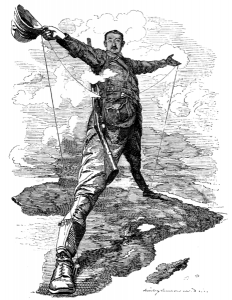At it’s very best, imperialism improved the standard-of-living of residents of conquered territories. That’s the best thing that can be said about imperialism. Check out the negatives:
- Exploited native resources and people for foreign gain
- Imposed alien culture on unwilling inhabitants
- Encouraged racism
- Fostered feelings of superiority and inferiority
- Created resentment among native peoples that resulted in devastating armed conflicts that are still present
Imperialism, quite frankly, tarnished Western Civilization’s image. We’re going to explore this intense topic over the next few weeks, but from a distinctly non-western perspective. Here are our 3 activities:
- Creation of the Living Wax Museum video
- Poetry Slam featuring Rudyard Kipling’s “White Man’s Burden”
- Cartoon Quest
Creation of Living Wax Museum
I’d like you to research a native who fought against foreign domination. There are many examples, both male and female. Their efforts could be non-violent. Let me approve your choice, then research your figure focusing on the following:
- Describe my subject’s early life
- What influenced him or her to take action?
- What form did this action take?
- How successful were their efforts?
- Why is your figure significant?
Now…THE CHALLENGE! You’re going to create a short video in which you, or perhaps a friend, assumes the role of the figure. Address the essential questions above. You don’t have to dress up or speak in an exotic accent, but if you’re so inclined…go for it!
Once you’re done with your interview, upload it to YouTube and post it to your blog.
Poetry Slam
You have 2 options in this portion of the enrichment:
- Analyze a poem
- Create a poem
The inspiration for either option is Rudyard Kipling’s “The White Man’s Burden”.
Original title: “The White Man’s Burden: The United States and The Philippine Islands”
Take up the White Man’s burden, Send forth the best ye breed
Go bind your sons to exile, to serve your captives’ need;
To wait in heavy harness, On fluttered folk and wild—
Your new-caught, sullen peoples, Half-devil and half-child.
Take up the White Man’s burden, In patience to abide,
To veil the threat of terror And check the show of pride;
By open speech and simple, An hundred times made plain
To seek another’s profit, And work another’s gain.
Take up the White Man’s burden, The savage wars of peace—
Fill full the mouth of Famine And bid the sickness cease;
And when your goal is nearest The end for others sought,
Watch sloth and heathen Folly Bring all your hopes to nought.
Take up the White Man’s burden, No tawdry rule of kings,
But toil of serf and sweeper, The tale of common things.
The ports ye shall not enter, The roads ye shall not tread,
Go mark them with your living, And mark them with your dead.
Take up the White Man’s burden And reap his old reward:
The blame of those ye better, The hate of those ye guard—
The cry of hosts ye humour (Ah, slowly!) toward the light:—
“Why brought he us from bondage, Our loved Egyptian night?”
Take up the White Man’s burden, Ye dare not stoop to less—
Nor call too loud on Freedom To cloak your weariness;
By all ye cry or whisper, By all ye leave or do,
The silent, sullen peoples Shall weigh your gods and you.
Take up the White Man’s burden, Have done with childish days—
The lightly proferred laurel, The easy, ungrudged praise.
Comes now, to search your manhood, through all the thankless years
Cold, edged with dear-bought wisdom, The judgment of your peers!
For option 1, research this poem, then respond to the following prompts in a blog post.
http://www.readwritethink.org/files/resources/lesson_images/lesson1160/poetry_analysis.pdf
For option 2, research this poem, then create a new poem which refutes Kipling’s argument. There are plenty of examples on the internet, but I want you to create your own, then post it on your blog.
Cartoon Quest
One of my favorite imperialism cartoons is of the British adventurer Cecil Rhodes.
From our vantage point, the cartoon seems arrogant and racist. In the late 19th Century, this cartoon was celebratory…towards Rhodes and Western Civilization! How odd!
Using a Google Advanced Image Search, or a Public Domain Image search, find an example of an imperialist era cartoon. This cartoon must convey a strong message that is interpreted differently today. Post the cartoon on your blog with an identifying caption. Then, address the following prompts:
- What’s the cartoon’s context?
- What’s the cartoon’s message?
- What’s the cartoon’s perspective?
- Is the cartoon racist?
- How do you perceive the cartoon from your modern vantage point?


